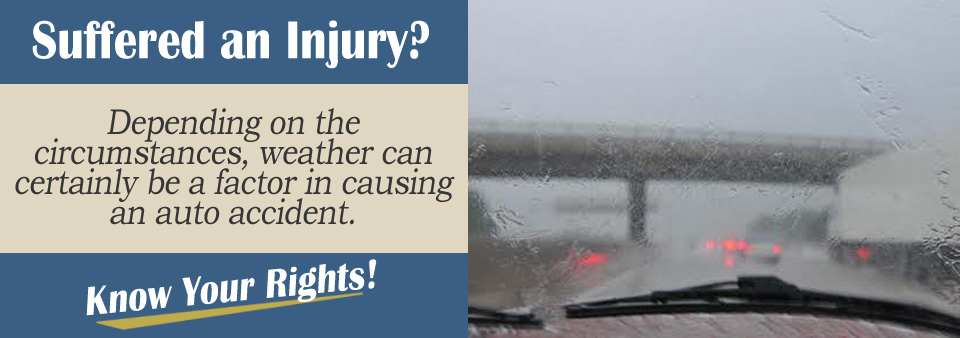You could be the best driver in the world, and all it takes is for a patch of black ice to ruin that impeccable record. However, you cannot sue the weather for an injury caused by a car accident; you can sue the driver. How much should weather play in mitigating the amount of liability a driver has for a car accident?
We have asked attorney, Alaina Sullivan, about what you should do. Here is what she had to say:
Driver Negligence
All drivers on the road are charged with a certain standard of care when operating a vehicle. This standard is usually what a reasonable person would do in the same or similar situation, otherwise known as the “reasonable person” standard.
If it is proven that a reasonable person would not have reacted in the way that the driver behind the wheel did react, and the driver is deemed to have breached his or her duty of care owed to others on the road, then driver will most likely be found to be negligent.
If it is determined that a reasonable person would have reacted in the same manner, the driver may not be found to be negligent.
Should weather play a factor? It depends on the circumstances involved. Weather certainly is a factor, but insurance companies or courts will look at the big picture, which includes not only the weather but the driver’s negligence.
Looking at All Factors
The insurance company or court will look at the entire situation, analyzing all contributing factors. This factors include how fast the driver was going, whether the driver was distracted or intoxicated, and the road conditions. Road conditions include how well the road was maintained and free from pot holes or other debris and visibility.
Weather also affects the road conditions. If it has been consistently sleeting for hours and the roads are a sheet of ice, this circumstance will play a huge part in determining the other driver’s fault.
If, however, the roads were only slightly wet and any reasonable driver would be able to safely navigate them following traffic laws, you may not be able to claim weather as a factor leading to your accident.

Adjusting to Your Circumstances
However, keep in mind that bad weather does not give you a free pass. Being a “reasonable driver” means acting as a reasonable driver would in that specific set of circumstances.
When the roads are slick, a reasonable driver would slow down and not drive too closely to other cars in front of him or her so as to avoid a potential accident. If you do not adjust your driving skills to the weather and your surroundings, you could also be deemed to be a negligent driver.
Mitigating Factors
Of course, the weather will not mean you are completely free from all fault. Rather, the weather will play a part in reducing the percentage of blame you have in the accident.
If the insurance company looks at the entire situation and determines that your driving was 70 percent of the cause of the accident while the weather played a part of about 30 percent of the accident, the damages you would be paying would be reduced by that amount. It all depends on your specific situation.
Contact an Attorney Today
If you feel you have a case, it is always recommended you speak with an attorney. A licensed personal injury attorney will be able to evaluate your case and determine if you have a claim against the other party’s insurance company.
To receive the compensation for your medical bills, property damages, and pain and suffering, you should speak with a personal injury attorney in your area today.